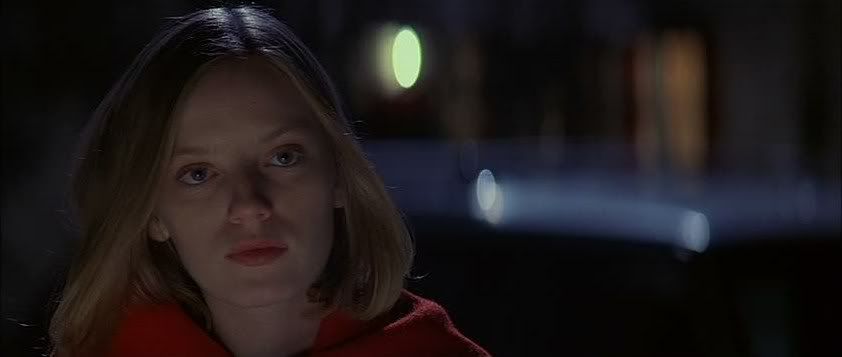
Atom Egoyan's The Sweet Hereafter is a bleak, melancholy film focused on a small, wintry mountain community where a school bus accident takes the lives of many of the town's children. It is a harrowing subject, a nightmare scenario that tears apart the lives of this town's families, of those left behind in its aftermath. And yet Egoyan's film does not truly do justice to this grief, does not truly develop this tragedy into something as deep or as powerful as it deserves. It is a tasteful, quiet treatment of tragedy, a film with many moments of devastating beauty, a film with an eye for telling details and small but suggestive moments. But, ultimately, it stays too close to the surface, gliding along superficially above the tragedy and the people it touches rather than trying to delve into their lives, their emotions, their characters. It is tragedy abstracted, nakedly hitting all the right tear-jerking buttons but only occasionally getting beyond such manipulations to a deeper core of human feeling.
Egoyan weaves together multiple time periods, blending the accident, the events leading up to it, and its aftermath, cutting between the time periods to explore the differences opened up when a school bus loaded with children slid off an icy road into a frozen lake, killing nearly everyone on board. Of the children, only Nicole (Sarah Polley) survives, albeit in a wheelchair, with no real memory of what had happened. The only other survivor is the driver, Dolores (Gabrielle Rose), a woman who had loved her job, who loved these children, and who, heartbreakingly, continues to refer to them in the present tense, as though they were all still alive. After the accident, a lawyer, Mitchell Stevens (Ian Holm), comes to town hoping to capitalize on these families' grief, insisting that what had seemed a simple and unavoidable accident was actually the result of someone's malfeasance: a flimsy guard rail, a badly maintained bus, cost-cutting measures at some school board or company. He convinces many of the families to join his suit, except for Billy (Bruce Greenwood), who's mourning his beloved twin children, and the wife he'd previously lost to cancer, but who refuses to take the easy way out and blame anyone for his grief.
The film introduces many characters as Stevens visits the town's grieving parents and recruits them into his lawsuit, but Egoyan hardly delves too deeply into anything. There are numerous subplots that percolate on the fringes of the film but never go anywhere. Bill was having an affair with Risa (Alberta Watson), whose husband is introduced in the opening scenes as a nasty redneck caricature, delivering painfully contrived dialogue meant to demonstrate, in bold-face and underlined type, that this formerly tight-knit town is going to be torn apart by the arrival of the exploitative lawyer. It's all so trite, so inorganic, as this jerk insults his neighbors and friends one by one, until Egoyan is sure that he's made his point. The script is filled with overwritten contrivances like this, moments when it becomes all too obvious that the film is going to be making its big point now; there's no subtlety, no attempt to develop such ideas organically through patient character development. There's hardly any character development at all, in fact, just a series of types. The incest subplot between Nicole and her father Sam (Tom McCamus) is similarly undeveloped and disconnected from everything else.

Although the film suffers from this lack of depth and subtlety, there's no doubt that Egoyan has an eye for compelling details and an ability to stage striking, even haunting images. There's something chilling about the scene of Nicole walking into a deserted barn with her father for what seems to be a romantic evening. Before she enters, she pauses outside, wrapped in a red shawl like Little Red Riding Hood — Egoyan continually connects her to fairy tales, both in her narration of the Pied Piper story as an allegory for the children's deaths and in her sad acknowledgment that, post-accident, she's no longer daddy's little princess. Moments like this linger in the imagination, and when Egoyan is able to touch upon such emotionally resonant moments, it's compelling, even if in the larger narrative the incest subplot is so undeveloped that it barely registers. (And even though the actual staging of the subsequent incest scene as a candlelit romantic moment is cringe-inducing.)
When Egoyan delves deeper into emotional territory, he comes away with stunning material, like Stevens' surprisingly touching account of how he'd once brought his daughter to the hospital for a life-threatening spider bite when she was a very young child. Egoyan hones in on a single moment, a single image: a closeup of the girl's expressionless face, cradled in her father's arms as he drives, with an open switchblade next to her face, her father's hand poised to perform a tracheotomy if her throat should close and her breathing choke off. It's a startling, emotionally fraught image, this juxtaposition of the child's innocent face and the hovering danger of the knife, a visual indication of this father's willingness to do anything to save his child.
Such moments are so emotionally rich, so suggestive of the depths of these characters, that one wishes Egoyan was able to cut so deeply all the time, that he was able to bring the same heft to the film as a whole. Unfortunately, too much of the film is shallow and mannered, and too many of the other characters seem to have no such depths to plumb. It's too often an approximation of grief rather than the real thing, a manipulative film that leans too hard on its central tragedy, relying on the horror of children dying to disguise the fact that Egoyan has little else to offer. Its supposed insights — small towns hide secrets, neighbors can easily turn on each other, lawyers are corrupt — are so shockingly obvious and time-worn that it's hard to believe Egoyan thinks he's revealing anything about the nature of grief or incest or parent/child relationships here. And at least one of its points, the idea that tragedy is often exploited, is merely ironic in light of the film's over-reliance on the tear-jerking aspects of its story. The Sweet Hereafter has moments of sad beauty, moments where some human spark shines through the contrivances of the script, but these moments are all too often overwhelmed by Egoyan's lite-tragic sensibility and the overstated simplicities that stand in for themes.









0Awesome Comments!